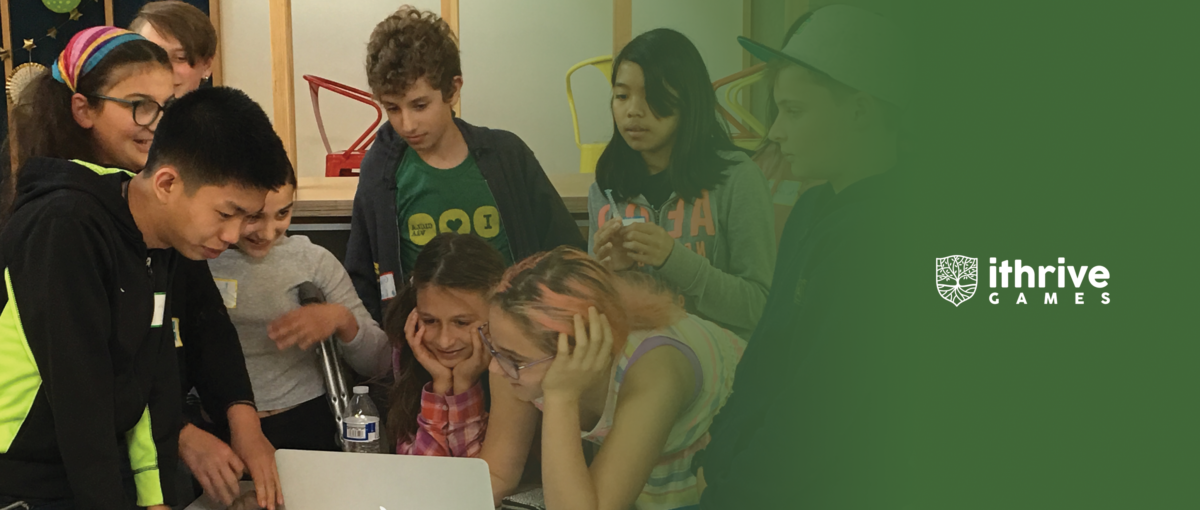
iThrive’s Resources for Educators: Using Games to Engage the Whole Teen
iThrive Games, founded in 2014, is a nonprofit committed to providing meaningful growth experiences for teens, both in and outside of the classroom. Through our education initiatives, launched in 2017, we strive to empower educators to integrate game-based learning in the classroom to support the development of the "whole teen," meaning attending to teens' cognitive, social, and emotional selves.
As iThrive collaborator and veteran social and emotional learning expert, Rachel Poliner, likes to say: "The whole teen is never NOT in front of you." Hoping to isolate the "cognitive self" of a teen — to get them to just pay attention and learn — is impossible and, in fact, counterproductive. Positive emotions and relationships facilitate learning. Only when teens feel safe, connected, and respected is full academic engagement possible. Teens' social and emotional selves are essential to learning.
Video games, both educational and commercial, have been used successfully in education for years, but have been used much less often with teens of middle and high school age than with younger children. They also have been used far too rarely to support social and emotional growth through practices like collaboration, self-reflection, good digital citizenship, and media literacy. Games are often excluded from secondary education in favor of more traditionally "acceptable" media like books and films. This is a huge missed opportunity. We believe that integrating video games into the secondary school classroom can facilitate teaching the whole teen, and we are partnering with innovative educators who are doing just this.
In line with our focus on developing the whole teen, iThrive provides resources and professional development opportunities to teachers to support integrating meaningful video gameplay into education. We invite you to explore our website for materials and updates on our offerings for educators, including our:
Curated Games Catalog
Our Curated Games Catalog is a library of meaningful video games from many genres, along with their age ratings, descriptions, and links to developers' websites. The catalog, curated by iThrive's team of psychologists and game designers with input from our network of experts, can assist you in choosing games that may support skills and habits that teens need to thrive, including Empathy, Curiosity, Growth Mindset, and Kindness. More games and practices are continually being added. Let us know if there's a game you don't see here that you think should be featured!
Article Series
In our games and education article series, we invite teachers and experts in game-based learning — as well as teens who have learned something valuable from their gameplay! — to share tips and resources for integrating video games successfully in the classroom to support rich learning experiences. Read insights from experts like Paul Darvasi, Barbara Chamberlin, and Jesse Schell, and look out for more engaging content that we're adding all the time:
- Game-Based Learning in the Classroom: 3 Essential Questions, by Barbara Chamberlin and Jesse Schell
- An Interview with Kinful: Bringing Cross-Cultural Empathy to Schools with VR, by Michelle Bertoli
- Meaningfully and Realistically Using Games in the Classroom, by Barbara Chamberlin
- Wallop! You Died (Again): Growth Mindset and Cuphead, by (teen contributor) Ian McDonald
- Putting It in Context: Using Commercial Video Games in Education, by Paul Darvasi
- We Can't Design Games for Teens Without This, by Susan Rivers and Gabrielle Rappolt-Schlichtmann
- How Bad Data Have Given Video Games a Bad Rap (and How to Read Beyond the Headlines), by Kelli Dunlap
- Zest in Video Games: Teens Need Some Excitement, by Michelle Bertoli and Heidi McDonald
- Purpose in Games: Empowering Teens to Explore Who They Are, by Michelle Bertoli and Heidi McDonald
- Video Games: A Safe Place to Wonder, by Michelle Bertoli and Heidi McDonald
- I Haven't Leveled Up...Yet: Growth Mindset in Video Games (Part 1), by Michelle Bertoli
- Video Games Can Boost Empathy, by Michelle Bertoli and Heidi McDonald
- Why Do Teens Play Video Games?, by Isaac Handley-Miner
Curricular Resources
iThrive has partnered with a large network of experienced secondary educators to develop rich curricular units around meaningful video games. Our initial efforts are focusing on the visually rich, deeply emotional What Remains of Edith Finch (rated 13+ years) and the heartbreaking social simulation and survival game, This War of Mine (rated 14+ years). These and other in-development units are designed to teach core subject matter in the humanities as well as key social and emotional skills for resilience, including social competence, autonomy, a sense of purpose and future, and problem-solving skills. Over the coming year, iThrive will develop, test, and share these curricular resources for teachers to use and adapt to the specific needs and interests of their teen students.
In the meantime, our Educator's Guides provide a quick overview of games like these that have been used successfully by our educator partners to teach meaningful social and emotional skills in the middle or high school classroom. Check out the guides here and consider how this type of gameplay might enrich your classroom:


We look forward to connecting with an ever-wider network of teachers who believe that meeting teens where they are, in both their virtual and physical worlds, to facilitate meaningful learning is key to their social and emotional growth and resilience. Contact us to get involved!


